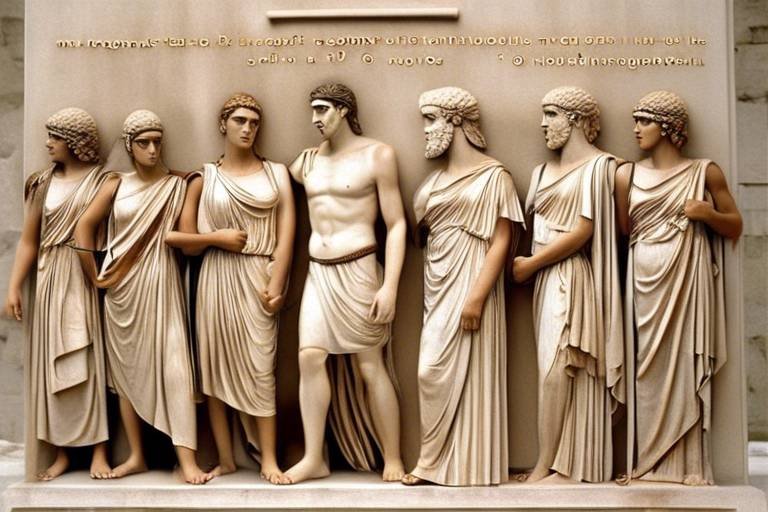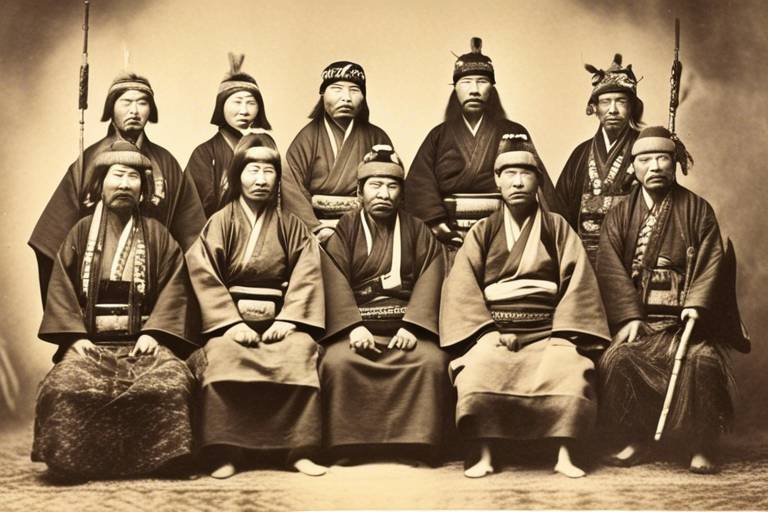The Influence of Ancient Rome on Western Philosophy
Ancient Rome stands as a towering figure in the history of Western philosophy, leaving an indelible mark on the intellectual landscape of the world. The philosophical traditions that emerged from the Roman Empire continue to shape our understanding of ethics, politics, metaphysics, and epistemology. From Stoicism to Neoplatonism, Roman philosophy has woven a rich tapestry of ideas that have endured the test of time.
One of the most influential schools of thought to emerge from ancient Rome is Stoicism. Founded by Zeno of Citium in the 3rd century BCE, Stoicism emphasizes the cultivation of virtue, resilience in the face of adversity, and living in harmony with the natural order. The Stoic legacy can be seen in modern discussions on mindfulness, emotional resilience, and ethical living.
Furthermore, Roman legal philosophy played a crucial role in shaping the foundations of modern legal systems. Concepts such as justice, jurisprudence, and the rule of law, developed by Roman jurists like Cicero and Ulpian, continue to underpin our understanding of legal principles and governance.
Delving into the realm of ethics, Epicureanism and hedonism, as espoused by the philosopher Epicurus, offered insights into the pursuit of happiness and the nature of pleasure. These ideas have influenced ethical theories and discussions on the balance between pleasure and virtue in contemporary moral philosophy.
Moreover, Roman skepticism challenged prevailing dogmas and beliefs, paving the way for a critical examination of knowledge and truth. Skeptical thinkers like Sextus Empiricus raised profound questions about the limits of human understanding, influencing the development of epistemology in Western philosophy.
The fusion of Platonic philosophy with mystical traditions in Neoplatonism exemplifies the syncretic nature of Roman thought. Figures like Plotinus sought to reconcile Platonic metaphysics with mystical experiences, shaping the contours of Western spiritual thought and metaphysical inquiry.
On the political front, Roman philosophers such as Seneca and Cicero grappled with questions of governance, citizenship, and the ideal state. Their reflections on the nature of power, justice, and civic duty continue to resonate in contemporary political philosophy and theories of governance.
Discussing the realm of education, Roman educational philosophies emphasized the cultivation of intellectual virtues and the pursuit of knowledge. Pedagogical practices in ancient Rome laid the groundwork for modern educational systems, highlighting the importance of critical thinking, rhetoric, and moral education.
Reflecting on the enduring legacy of Roman philosophers like Seneca, Cicero, and Marcus Aurelius, it becomes evident that their contributions have left an indelible mark on Western philosophical traditions. Their insights into ethics, politics, and metaphysics continue to inspire philosophical inquiry and ethical reflection in the contemporary world.

Stoicism and its Legacy
Stoicism, originating in ancient Rome, is a philosophical school of thought that emphasizes the importance of virtue, self-control, and acceptance of fate. The Stoics believed in living in accordance with nature and focusing on what is within our control, rather than being consumed by external events. This philosophy has left a lasting legacy on Western thought, influencing ethical discussions and personal development.
One of the key figures in Stoicism is the Roman philosopher Seneca, known for his writings on the importance of reason and moral integrity. His works have been instrumental in shaping the Stoic principles of resilience and inner peace in the face of adversity. The Stoic legacy also includes the teachings of Epictetus and Marcus Aurelius, whose insights on the nature of happiness and the power of the mind continue to inspire individuals seeking wisdom and guidance.
Stoicism's emphasis on living a virtuous life and maintaining a sense of tranquility in turbulent times has resonated with many throughout history. Its focus on personal responsibility and ethical behavior has found relevance in contemporary discussions on mental well-being and moral philosophy. The Stoic legacy serves as a reminder of the enduring value of cultivating inner strength and moral clarity in a complex world.

Roman Legal Philosophy
Roman Legal Philosophy played a pivotal role in shaping the foundation of modern legal systems and principles. The ancient Romans were known for their meticulous approach to law and justice, laying the groundwork for many legal concepts that are still in use today. One of the key contributions of Roman legal philosophy was the development of a comprehensive legal system that emphasized the importance of fairness, equality, and the rule of law. This system formed the basis for modern jurisprudence and legal theory, influencing how laws are interpreted and applied in contemporary society.
Central to Roman legal philosophy was the concept of justice, which was seen as the cornerstone of a well-ordered society. Roman jurists sought to establish laws that were based on reason and equity, ensuring that all individuals were treated fairly under the law. This emphasis on justice and impartiality continues to be a fundamental principle in legal systems around the world, reflecting the enduring legacy of Roman legal thought.
Furthermore, Roman legal philosophy also focused on the idea of the rule of law, which stipulated that no individual, not even the most powerful, was above the law. This principle of legal equality and accountability remains a core tenet of modern legal systems, ensuring that all individuals are subject to the same legal standards and obligations. The Roman emphasis on the rule of law helped to prevent arbitrary exercise of power and promote a system of governance based on laws rather than personal whims or preferences.
Additionally, Roman legal philosophy delved into the concept of jurisprudence, the study and interpretation of law. Roman jurists developed sophisticated legal theories and methodologies for analyzing and applying laws, laying the groundwork for the development of legal reasoning and argumentation. These legal principles and practices continue to influence how laws are interpreted and enforced in contemporary legal systems, highlighting the enduring impact of Roman legal philosophy on the field of law.

Epicureanism and Hedonism
Epicureanism and Hedonism represent two distinct philosophical schools of thought that emerged in ancient Rome, each with its own unique perspective on the pursuit of happiness and ethical living.
Epicureanism was founded by the Greek philosopher Epicurus and gained popularity in Rome during the Hellenistic period. This philosophy emphasizes the importance of seeking pleasure and avoiding pain as the ultimate goal of life. However, Epicurus' concept of pleasure goes beyond mere physical gratification; it also includes mental tranquility and the absence of fear or anxiety. The pursuit of ataraxia, or peace of mind, is central to Epicurean ethics.
Contrary to common misconceptions, Epicureanism does not promote excessive indulgence or hedonistic behavior. Instead, it advocates for moderation, self-control, and the cultivation of simple pleasures that lead to long-term fulfillment. By prioritizing inner contentment over external desires, Epicureanism offers a practical guide to living a fulfilling and meaningful life.
Hedonism, on the other hand, is a broader philosophical concept that encompasses various schools of thought emphasizing pleasure as the highest good. In ancient Rome, hedonism was often associated with the pursuit of sensual pleasures and immediate gratification. The Roman poet Horace famously encapsulated this ethos with the phrase "carpe diem," urging individuals to seize the day and enjoy life's pleasures to the fullest.
While Epicureanism and hedonism share a focus on pleasure, they differ in their approaches to achieving happiness. Epicureanism promotes a more nuanced understanding of pleasure, rooted in moderation and intellectual pursuits, while hedonism tends to prioritize immediate gratification and sensory experiences.
Ultimately, both Epicureanism and hedonism offer valuable insights into the nature of happiness and the ethical considerations surrounding pleasure. By exploring these philosophical traditions, we can gain a deeper understanding of the complexities of human desires and the pursuit of a fulfilling life.

Roman Skepticism
Roman skepticism in ancient Rome was a philosophical tradition that challenged prevailing beliefs and emphasized the importance of critical inquiry and doubt in the pursuit of knowledge. Skeptic philosophers such as Sextus Empiricus and Cicero questioned the certainty of human understanding and the reliability of sense perception, advocating for a suspension of judgment in the face of conflicting opinions.
These skeptics argued that absolute certainty was unattainable and that one should approach knowledge with caution, questioning assumptions and avoiding dogmatism. By questioning the foundations of knowledge and belief, Roman skeptics paved the way for the development of epistemology, the branch of philosophy that examines the nature and limits of human knowledge.
One of the key aspects of Roman skepticism was its emphasis on intellectual humility and open-mindedness, encouraging individuals to engage in critical reflection and examination of their beliefs. The skeptical tradition in ancient Rome played a significant role in shaping the philosophical landscape of the time, challenging established authorities and promoting a spirit of inquiry and skepticism.

Neoplatonism and Mysticism
Exploring the profound impact of ancient Roman philosophy on the development and evolution of Western philosophical thought, shaping key concepts and ideas that continue to influence modern philosophical discourse.
Neoplatonism, a philosophical movement that emerged in ancient Rome, sought to synthesize Platonic thought with mystical traditions, delving into the metaphysical and spiritual realms. This fusion of philosophy and mysticism aimed to explore the nature of reality, the existence of the divine, and the relationship between the material and immaterial worlds.
Central to Neoplatonism was the concept of the One, the ultimate source of all existence and the foundation of reality. Neoplatonist philosophers such as Plotinus emphasized the transcendental nature of the One, viewing it as the pinnacle of existence from which all things emanate.
Furthermore, Neoplatonism delved into the notion of the soul's journey towards unity with the One, advocating for contemplation, virtue, and spiritual purification as means to ascend the metaphysical hierarchy towards the divine. This mystical aspect of Neoplatonism influenced later Christian mysticism and shaped the mystical traditions of the Middle Ages.
The legacy of Neoplatonism extends to modern philosophical thought, particularly in its exploration of the nature of reality, the relationship between the material and spiritual realms, and the quest for ultimate truth and enlightenment. The mystical underpinnings of Neoplatonism continue to inspire philosophical inquiry into the mysteries of existence and the transcendent dimensions of human experience.

Roman Political Philosophy
Roman political philosophy in ancient times was a rich tapestry of diverse ideas and ideologies that shaped the governance and structure of society. Philosophers like Cicero and Seneca delved into the nature of power, citizenship, and the role of the state in ensuring the well-being of its citizens. They pondered questions of justice, the common good, and the responsibilities of rulers towards their subjects.
One of the key aspects of Roman political philosophy was the concept of res publica, meaning "public affair" or "commonwealth." This idea emphasized the collective interest of the people and the importance of civic duty in maintaining a stable and harmonious society. Roman thinkers believed that good governance required the participation of all citizens in the political process, promoting the idea of a shared responsibility for the well-being of the state.
Furthermore, Roman political philosophy explored the balance of power between different branches of government, advocating for a system of checks and balances to prevent the concentration of authority in the hands of a single individual or group. This principle of separation of powers influenced later political thinkers and was incorporated into modern democratic systems.
Philosophers in ancient Rome also debated the nature of law and its relationship to justice. They questioned the source of authority for laws, the role of tradition in legal systems, and the ethical principles underlying legal decisions. Roman legal philosophy, with its emphasis on equity and fairness, laid the foundation for the development of modern legal codes and the concept of rule of law that transcends individual rulers.
In essence, Roman political philosophy provided a philosophical framework for understanding the dynamics of power, governance, and citizenship in society. Its legacy continues to influence political thought and practice, reminding us of the enduring relevance of ancient wisdom in shaping our collective destinies.

Roman Philosophy of Education
In ancient Rome, the philosophy of education was deeply intertwined with the values and goals of society. Roman educational philosophies emphasized the cultivation of virtues such as discipline, duty, and civic responsibility. Education was seen as a means to instill moral values and prepare individuals to contribute meaningfully to the community. The Roman system of education focused on developing well-rounded individuals who were not only knowledgeable but also ethically sound.
One of the central aspects of Roman education was the emphasis on practical skills and real-world application of knowledge. Students were taught subjects such as rhetoric, grammar, and philosophy, but the ultimate goal was to equip them with the tools necessary to succeed in public life. The Roman philosophy of education aimed to produce citizens who could engage in public discourse, uphold the values of the state, and contribute to the betterment of society.
Furthermore, Roman education was hierarchical, with different levels of schooling catering to individuals based on their social status and future roles in society. Children of the elite received a more advanced education focused on leadership, governance, and public speaking, while those from lower classes were trained in practical skills and trades. This stratified approach to education reflected the social structure of Roman society and reinforced existing power dynamics.
The Roman philosophy of education also placed a strong emphasis on the role of teachers as moral guides and mentors. Educators were expected not only to impart knowledge but also to instill values such as integrity, loyalty, and respect for authority. The relationship between teacher and student was viewed as sacred, with teachers serving as role models for their pupils and guiding them on the path to intellectual and moral excellence.
Overall, the Roman philosophy of education was instrumental in shaping the values and ideals of Roman society, laying the foundation for the educational systems that would follow in Western civilization. The emphasis on moral character, practical skills, and civic duty continues to influence modern educational practices, highlighting the enduring legacy of Roman educational philosophies.

Legacy of Roman Philosophers
Roman philosophers such as Seneca, Cicero, and Marcus Aurelius have left an indelible mark on Western philosophical traditions and ethical principles. Seneca, known for his Stoic philosophy, emphasized the importance of self-control, virtue, and resilience in the face of adversity. His writings on ethics and moral conduct continue to inspire individuals seeking inner peace and wisdom.
Cicero, a prominent statesman and orator, contributed significantly to political theory and rhetoric. His works on the ideal state, natural law, and the duties of citizens have influenced political thinkers throughout history. Cicero's emphasis on justice, law, and the common good remains relevant in contemporary discussions on governance and democracy.
Marcus Aurelius, the Roman Emperor and Stoic philosopher, is renowned for his "Meditations," a collection of personal reflections on Stoic principles and the nature of virtue. His meditations on the transience of life, the importance of self-discipline, and the pursuit of inner tranquility continue to resonate with readers seeking guidance in navigating life's challenges.
Together, these Roman philosophers have bequeathed a rich intellectual legacy that continues to shape philosophical discourse and ethical thought in the Western world. Their insights into human nature, virtue, and the quest for a meaningful life serve as timeless reminders of the enduring value of philosophical inquiry and self-reflection.
Frequently Asked Questions
- What is the significance of ancient Roman philosophy in Western thought?
Ancient Roman philosophy played a crucial role in shaping the foundation of Western philosophical thought. It influenced key concepts and ideas that continue to impact modern philosophical discourse, contributing to the development of ethics, politics, law, and metaphysics.
- How did Stoicism influence modern ethical discussions?
Stoicism, a prominent school of thought in ancient Rome, emphasized virtues such as wisdom, courage, justice, and temperance. Its teachings on self-control, resilience, and acceptance of fate have left a lasting legacy in contemporary ethical theories and practices.
- What are the key contributions of Roman legal philosophy to modern legal systems?
Roman legal philosophy introduced fundamental concepts such as justice, jurisprudence, and the rule of law. It laid the groundwork for the development of legal principles and institutions that form the basis of modern legal systems around the world.
- How did Epicureanism and Hedonism impact Western ethical theories?
The teachings of Epicurus and the philosophy of hedonism in ancient Rome focused on the pursuit of happiness and pleasure. These ideas have influenced ethical theories by exploring the nature of happiness, the role of pleasure in human life, and the pursuit of a good life.
- What is the legacy of Roman philosophers like Seneca, Cicero, and Marcus Aurelius?
Roman philosophers such as Seneca, Cicero, and Marcus Aurelius made significant contributions to Western philosophical traditions and ethical principles. Their writings on virtue, morality, and governance continue to inspire philosophical inquiry and ethical reflection.



















